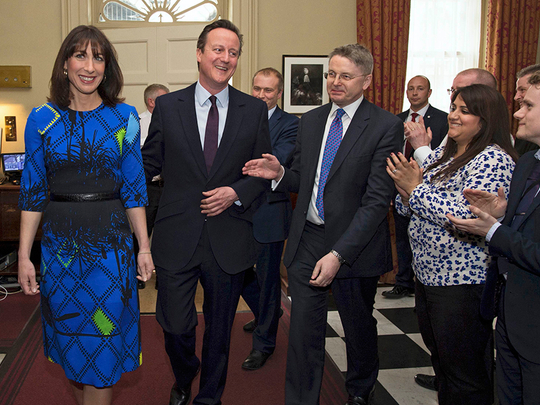
London: Fresh from the most extraordinary House of Commons election victory since the Second World War, British Prime Minister David Cameron has insisted that he will hold a referendum on the UK’s European Union membership within two years.
The scale and scope of Cameron’s victory — he now commands 331 seats, five more than the 326 needed to form a majority in the 650-member Commons — defied opinion poll predictions.
But it is also raising concerns across the EU, given the challenge in appeasing London’s demands for reforms without provoking similar demands from every other capital in the 28-member political and economic union.
On Friday night, Cameron reappointed as foreign secretary Philip Hammond, who has made efforts over the last months to build stronger ties with those European capitals.
George Osborne’s position has been strengthened. He remains Chancellor of the Exchequer but, in effect, becomes deputy prime minister as the first secretary of state. Theresa May and Michael Fallon remain as home secretary and defence secretary respectively.
But Cameron’s new Cabinet will likely take on a distinctly more Eurosceptic tone with promotions predicted on Monday for ministers Priti Patel and Andrea Leadsom, as well as the chairman of the influential 1922 Committee of backbenchers, Graham Brady.
European Commission President Jean-Claude Juncker has held out an olive branch to Cameron in the hope that the prevailing anti-European sentiment will fade in the coming months once election mania eases. “I stand ready to work with you to strike a fair deal for the UK in the EU,” Juncker said.
Cameron has declared his preference to stay in the European Union, though it is unclear how much political capital he is prepared to expend on the issue, given that nearly two-thirds of his party’s grass roots membership want to quit the union.
A recent opinion poll suggests that if a vote on the EU were to be held now, 18 per cent of Britons would vote to leave. But that poll also predicted that Labour and Conservative support was level before Thursday vote. Clearly, it wasn’t.
But pushing hard on anti-EU policies may very well play into the hands of the strong independence sentiment in Scotland.
The Scottish National Party (SNP) has insisted that it will press to hold a second independence referendum in Scotland if voters across the UK voted to quit the EU — a view shared in Wales and Northern Ireland, too.
The Labour Party is set for a period of soul-searching as it starts choosing a replacement for Ed Miliband, who stood down as leader saying he took “absolute and total responsibility” for their poor showing.
The tricky challenge is to find a leader who can win back those voters who have moved leftward to the SNP in Scotland — hitherto a Labour heartland — and those who swung behind the Conservatives in suburban England.
Nick Clegg, the outgoing deputy prime minister, was among the eight Liberal Democrats re-elected but shortly afterwards resigned the party leadership, saying: “The results have been immeasurably more crushing than I could ever have feared.”
— With inputs from agencies












